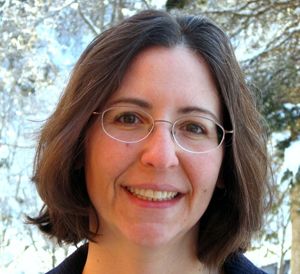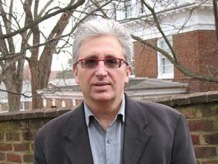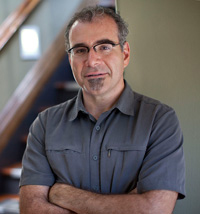IATH NEWS
2011 IATH Fellows announced
April 18, 2011
IATH is pleased to announce the new IATH Fellows for 2011-2012. Each year IATH offers a two-year Resident Fellowship to a UVA Faculty member, providing office space at the Institute, design and development assistance, use of equipment and software, training, computer programming, budget resources, and development assistance to raise additional grants and gifts to support the research project. One or more Associate Fellowships are awarded each year and include consulting services on project design and technical issues, equipment loans, and grant assistance.

Lise Dobrin
The 2011 IATH Resident Fellowship has been awarded to Lise Dobrin, Assistant Professor of Anthropology, for the Arapesh Grammar and Digital Language Archive project (http://www.arapesh.org). Building on work originally funded by NEH through the interagency "Documenting Endangered Languages" initiative, the goal of Dobrin's project is to preserve, analyze, and disseminate information about the endangered Arapesh languages, which are traditionally spoken by Melanesian people on the north coast of Papua New Guinea. Arapesh is of special significance to linguistic theory because of its typologically unusual system of noun classification, which is based primarily on categories of speech sounds, as opposed to meaning.
Many linguists and anthropologists have become interested in language documentation and conservation in recent years as languages are threatened with extinction. Linguists like Dobrin have been working to develop ethical methodologies for research with marginalized speaker communities, along with documentary and archival standards for proper management of digital language materials. The dialect of Arapesh that Dobrin's project documents most extensively is now spoken fluently by fewer than a hundred elderly people.
The Arapesh project is based on field research that Dobrin carried out in Papua New Guinea in the late 1990s, when she collected various genres of Arapesh oral discourse as a doctoral student in linguistics. The archive integrates a substantial body of linguistic data in audio and text formats with a descriptive catalog and a database of lexical and grammatical information. The archive is built entirely on open standards and technologies.

Alon Confino

Mitchell Green (photo by Dan Addison)
Two Associate Fellowships have also been awarded, to Alon Confino, Professor of History, for a project focused on the 1948 war in Palestine, and Mitchell Green, Professor of Philosophy, to develop a digital tool that supports philosophical inquiry.
Prof. Confino will be building a digital history project that uses visual technology to present more nuanced and complex narratives of the 1948 Arab-Israeli War. Digital tools can juxtapose intricately interconnected personal and national histories in a more comprehensive and immediate fashion, beyond the familiar bifurcation of Zionist and Palestinian interpretations. The project will place side-by-side multiple sources that are commonly considered separately, including individual, local, and national documents and recollections. The materials will be placed in context and an overall narrative of events will be provided, but the project will not link them together to create a linear narrative or single argument. Rather, the project will illustrate the complexities and contradictions of memory and history, and thus uncover the process by which historians construct arguments, choose evidence, and make interpretations that explain "what happened."
The project arose from his research interests in forced migrations and problems of memory, narrative, and historical method. Since 2009, he has been the co-director of a UVA research group, "Forced Migrations in the Modern World," which includes historians, sociologists, and literary, legal, and religious scholars. The project will begin by focusing on the history and the experiences of the Arab village of Tantura and the Jewish/Arab city of Haifa, located within a few miles of each other on the Mediterranean coast in northern Palestine.
Prof. Green will be building an on-line platform to support philosophical inquiry. The platform, currently dubbed BSocratic, will ask users to choose questions in core philosophical areas (such as ethics or political philosophy) and to then address a central question related to that area. The user's answer will call up a set of objections, clarifications, and nuances, along with options to retract or refine the answer. When the user updates his or her answer, a new set of challenges and clarifications will appear. After a number of iterations, the user will have a refined, clear, and defensible position. The user can also add new positions and responses to objections as the argument develops. Alternatively, users can retrace the paths that major figures in philosophy used to develop their own arguments.
Prof. Green received a three-year NEH/Horace W Goldsmith Distinguished Teaching Professorship in 2009 to develop tools for engaging high school students in philosophical discussion. The BSocratic project derives from this work, but it is intended to aid research as well as teaching, since it will bring out the dialectical structure integral to philosophical inquiry.
IATH's Fellowship program supports two distinct areas of research: (1) the development of tools, scholarly resources, or scholarly projects utilizing digital technology for analysis, investigation, modeling or other research activities; and (2) the study of the nature, ethics, history, or future of digital technology as applied to some aspect of the humanities. Fellows developing scholarly tools or projects aim at creation of a new digital product, or at least a prototype, during their tenure. Information about the Fellow application process is available on-line.
